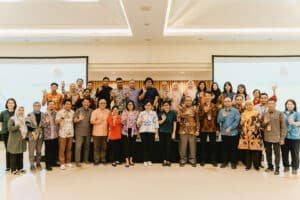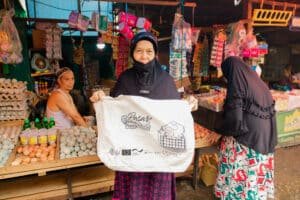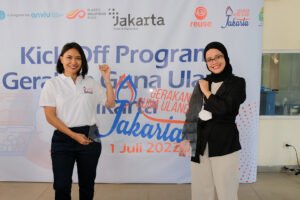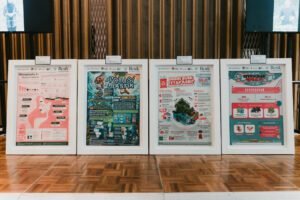The Indonesian Plastic Bag Diet Movement (GIDKP), in collaboration with the Bandung City Environment and Hygiene Service and Perumda Pasar Juara, has a mission to socialize the reduction in the use of plastic bags at the Bandung City People’s Market through the “Plastic Free Market” program. This program is also a form of implementation related to Regional Regulation Number 17 of 2012 concerning Reducing the Use of Plastic Bags which was followed up with the issuance of Bandung Mayor Regulation Number 37 of 2019 concerning Guidelines for Implementing Bandung City Regional Regulation Number 17 of 2012. People’s Markets are among the regulated subjects. More attention is needed to reduce plastic waste generation because as much as 45% of plastic bag waste comes from people’s markets (GIDKP, 2021). The markets used as models for implementing the Plastic Free Market are Kosambi Market and Cihapit Market.
A Plastic Free Market can be realized by implementing several programs first, such as needing to carry out baseline research on traders in the market so that preparation of the program structure that will be carried out later can run according to the desired results. Baseline research was carried out over four days on 23-26 February 2021. The results of the baseline research showed that the use of extensive plastic bags issued at Cihapit Market was at least 1,368 pieces a day and at least 5,971 pieces a day at Kosambi Market. Meanwhile, the use of small plastic bags issued at Cihapit Market is at least 1,200 pieces a day and as many as 5,300 pieces a day at Kosambi Market. These plastic bags are given mainly by vegetable/fruit traders, meat traders, and food/grocery traders, where these traders are the traders who are most in demand and sought after in the market.

The average cost for large, small, and handleless plastic bags issued by traders at Cihapit Market is IDR 74,000 per month, and IDR 251,000 per month at Kosambi Market. As many as 84.25% of traders in the market also stated that they were willing to reduce the use of single-use plastic. The traders’ responses regarding the plastic-free market are mostly in agreement and support. Still, implementation in the field requires a long time to continuously remind, encourage, and educate traders to reduce single-use plastic bags.
Most traders are worried that there will be fewer consumers if they do not offer free plastic because it is customary to provide and give away plastic for free to consumers. This is different with plastic traders, some of whom do not agree because their business will be affected by this program, and others agree and support it. However, there must still be other ways that can benefit them, one of which is by providing alternative merchandise to replace disposable plastic bags.
Apart from baseline research, a Focus Group Discussion (FGD) was also conducted with market traders to discuss and discuss ideas for environmentally friendly shopping bags that are suitable for each type of business actor as well as creative ideas to attract the public or consumers to support the use of environmentally friendly bags, especially in Cihapit and Kosambi markets. Traders and market staff attended this activity, as well as the Bandung City Environment and Hygiene Service, Perumda Pasar Juara, and providers of environmentally friendly alternative bags.

The FGD activity was carried out over two days, with each market holding separate discussions. From the results of the debate, it can be concluded that the obstacles or constraints felt by traders are the existence of consumers who ask for excess plastic bags and are reluctant to ask buyers whether they brought their bags or not because it is possible that some people do not know about the ban. Apart from that, traders also discussed alternative solutions that could be implemented, including the implementation of SOPs asking traders to ask consumers, giving bonuses/discounts to consumers who shop using reusable bags, traders expected to provide plastic bags at their kiosks no longer, reminding consumers to bring their containers and create creative campaigns.
All these programs cannot be realized if there is no support from the government and the market. Support that can be provided is in the form of outreach to consumers/community around the market area, providing subsidies for alternative bags and supervision carried out by DLHK and Perumda Pasar and, of course, all traders simultaneously to implement a reduction in the use of single-use plastic.







